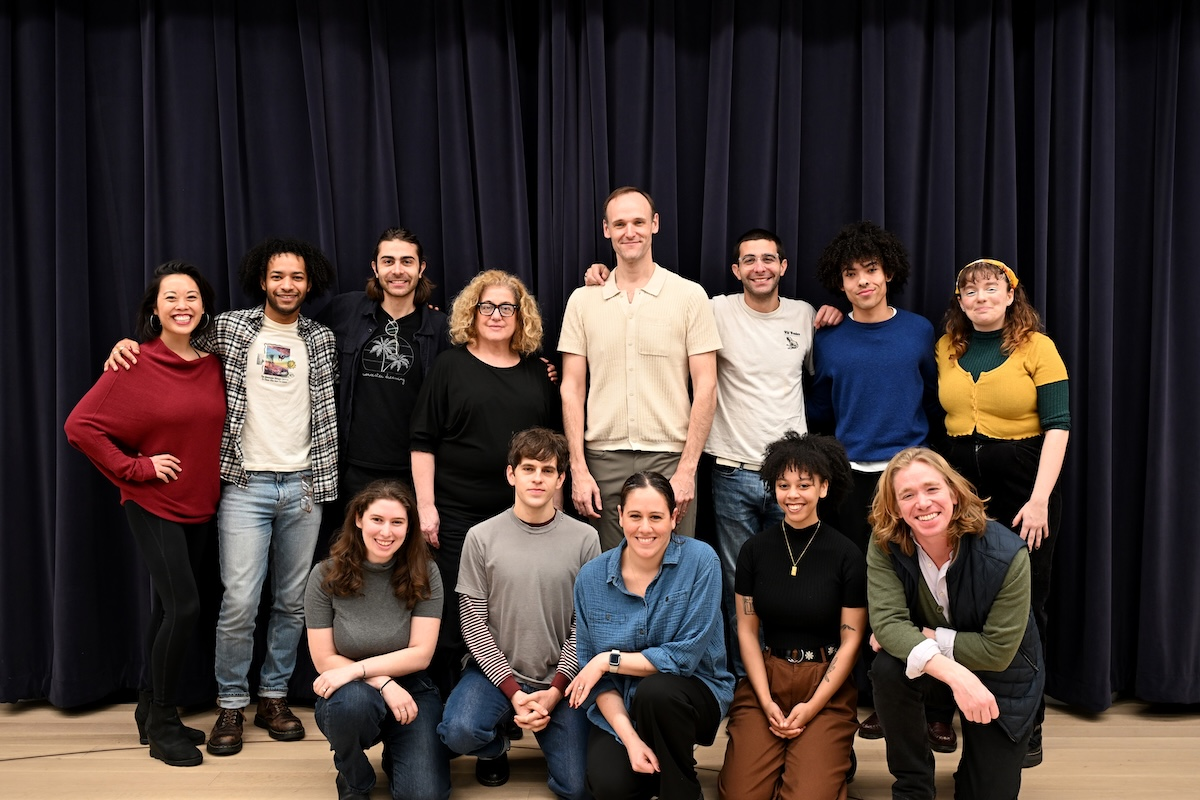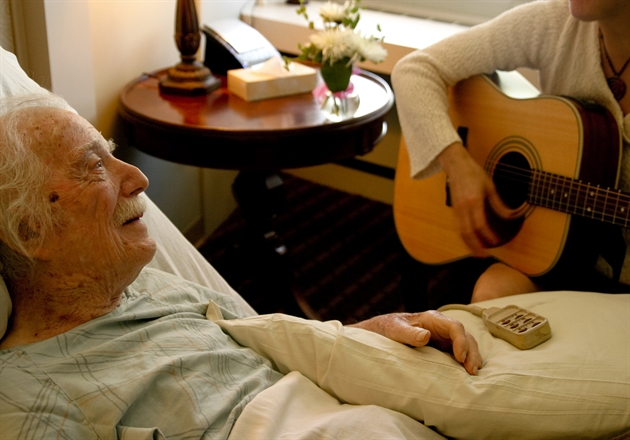The musical “Night Side Songs” dives deep into the world of palliative care, artfully blending the serious subject of illness with engaging storytelling and music. Created by Daniel and Patrick Lazour, this thought-provoking production sheds light on the often-taboo topic of death and dying, showcasing the emotional journeys of cancer patients alongside their healthcare providers. Through expert guidance from palliative care specialist Susan Block, the musical illuminates the raw, human experiences faced by those navigating end-of-life care. As audiences connect with the poignant narrative, they are invited to reflect on their own perceptions of mortality and the healthcare system. “Night Side Songs” is not just a musical; it’s a vital conversation starter that challenges us to embrace discussions about illness and the intricacies of compassionate care.
Exploring themes of life, death, and the vibrant experiences that intersect with them, “Night Side Songs” emerges as a groundbreaking theatrical piece. With its roots in the challenging realities of end-of-life care, the production uniquely blends the roles of patients and medical professionals, inviting a dialogue rarely addressed in mainstream musicals. The insights of Susan Block, a luminary in psychosocial oncology, ensure that the narrative is both authentic and deeply resonant. Audiences are called upon to engage with the profoundly intimate moments that accompany serious health challenges, creating a bridge between the stage and their own experiences. Ultimately, this musical not only entertains but also educates, pushing the boundaries of how theater can influence conversation around major life events.
The Role of Theater in Palliative Care Conversations
The integration of theater into discussions surrounding palliative care can be transformative. Productions like “Night Side Songs” offer a unique platform to explore difficult topics such as illness and death in a way that is both poignant and accessible. As Susan Block highlights, the emotional journey presented in the musical resonates with audiences, prompting necessary conversations that often remain unspoken. This artistic approach helps break down barriers surrounding the stigma of discussing end-of-life care, thus allowing for a supportive dialogue about these experiences both on and off stage.
Furthermore, engaging with performance art allows for an exploration of emotional truths related to illness that can be challenging to articulate. When audiences witness the vulnerabilities of characters, they often find reflections of their own fears and experiences, fostering a sense of community and shared understanding. By placing palliative care narratives within a theatrical context, programs like “Night Side Songs” not only entertain but serve a crucial role in educating the public about the complexities of cancer care and the experiences of both patients and caregivers.
Exploring Illness Through Music: ‘Night Side Songs’
“Night Side Songs” stands as a groundbreaking musical that addresses themes of illness and mortality through its original score and impactful lyrics. Drawing inspiration from Susan Sontag’s observations on illness, the Lazour brothers have crafted a narrative that allows audiences to confront the often-taboo subjects surrounding death. This kind of artistic endeavor is rare but essential, as it bridges the gap between the sterile language of medical discourse and the deeply human experiences of those battling illness. In doing so, the musical brings vital awareness to the importance of considering emotional and psychological aspects in the field of palliative care.
The music serves not just as an accompaniment to the dialogue but as a vehicle for conveying the emotional weight of the narrative. Each song encapsulates the thoughts and feelings of characters—from patients to caregivers—giving voice to their struggles and triumphs. This innovative blend of storytelling and music can deeply impact audiences, encouraging them not only to relate personally to the characters but also to engage with broader societal issues surrounding health and end-of-life care. By infusing joy, sorrow, and everything in between, “Night Side Songs” reflects the complexities of human experience with authenticity.
Susan Block’s Pioneering Work in Palliative Care
Susan Block’s contributions to palliative care have been fundamental in shaping how healthcare providers approach the treatment of dying patients. As the founding chair of the department of psychosocial oncology and palliative care at Dana-Farber, she has spent decades advocating for compassionate and holistic approaches to care. Her insights are invaluable, particularly in understanding how emotions play a critical role in the experience of illness. By collaborating with artists like the Lazour brothers, Block helps to imbue the serious themes of health care and dying with a sense of humanity and connection.
Additionally, Block’s emphasis on open discussions regarding death and dying challenges prevailing norms within the healthcare system. By promoting conversations that bring families and patients together, she seeks to dismantle the stigma surrounding end-of-life issues that many individuals face. The integration of her work with performance art in productions like “Night Side Songs” highlights a growing recognition of the necessity for empathy, openness, and support in palliative care, ultimately fostering an environment where patients can express their fears without judgment.
The Impact of Musical Theater on Public Perceptions of Illness
Musical theater has a unique power to influence public perceptions of serious topics such as illness and dying. By presenting these subjects in a relatable format, shows like “Night Side Songs” break down barriers and foster dialogue among audience members. This cultural shift not only helps normalize discussions about end-of-life but also provides a platform for stories that explore the complexities of cancer patient experiences. In this way, the musical serves as an important educational tool in raising awareness and encouraging discussions about palliative care in casual and formal settings.
Moreover, the accessibility of musical theater allows for a wider range of audiences to engage with serious themes. Audiences may find it easier to digest challenging topics when presented in a creative and entertaining manner. This contrasts with traditional approaches to discussions around illness, which can often feel clinical or detached. By engaging emotions through music and performance, productions like “Night Side Songs” can inspire individuals to explore their own experiences and attitudes toward illness, ultimately leading to a more informed and compassionate society.
Creating Intimacy in Performance: The Power of Smaller Venues
The decision to stage “Night Side Songs” in smaller, more intimate venues plays a significant role in how the audience connects with the performance. By utilizing settings such as the Cambridge Masonic Temple or Hibernian Hall, the Lazour brothers and A.R.T. create a space where the emotional nuances of the story can be felt more deeply. Audiences seated in the round encourage participation and interaction, helping to establish a community atmosphere that enhances the overall experience. This closeness allows for a more profound engagement with the themes of cancer and caregiving, making it easier for viewers to relate personally to the characters.
Intimacy in theatrical performance can amplify the emotional impact of the narrative. In smaller settings, the audience can witness the actors’ expressions more closely, fostering a visceral connection that might be lost in larger theaters. This personal connection is crucial when tackling heavy subjects such as death and dying, as it encourages audience members to empathize with the characters, leading to a shared emotional journey. Such immersive experiences in venues like these not only enhance the appreciation for the performing arts but can also catalyze crucial conversations surrounding end-of-life care and palliative approaches.
Understanding Dying Through Community Engagement
The communal aspect of experiencing a musical like “Night Side Songs” provides a vital space for reflection and understanding regarding illness. As audience members share the experience together, they are also given the opportunity to express their emotions and thoughts about serious topics surrounding health and mortality. This communal engagement can help mitigate the feelings of isolation often felt by those dealing with serious illness, as it aligns the experience of the patient with that of the audience members, who may have their own stories to tell.
Furthermore, the act of discussing and processing themes of dying in a group setting enhances the understanding of palliative care. When people are encouraged to share their thoughts after witnessing a performance, it can lead to insights that challenge societal norms regarding death and dying. As Susan Block notes, creating spaces for conversations that explore these difficult subjects contributes to a broader understanding and acceptance of palliative care, ultimately reshaping public perceptions and experiences of end-of-life care.
Breaking the Silence on End-of-Life Issues
In today’s society, discussions about death and dying often remain shrouded in silence. This cultural phenomenon can be detrimental, leading to feelings of isolation for both patients and their families. “Night Side Songs” tackles this silence head-on, offering audiences an opportunity to confront their fears surrounding illness through music and storytelling. By integrating the insights of palliative care specialists like Susan Block, the musical encourages open dialogues about end-of-life issues, challenging the taboo surrounding these themes within our communities.
The very premise of the show invites audiences to engage with their discomfort, leading to meaningful conversations around topics such as grief and vulnerability. Many individuals, as Block points out, often feel that expressing their fears will only exacerbate the distress of their loved ones. Productions like “Night Side Songs” can help dismantle this stigma by facilitating discussions that honor the complexity of the human experience, allowing individuals to navigate their feelings in a supportive environment.
The Importance of Accurate Representation in Arts and Health
Accuracy in the representation of medical and emotional realities in theatrical productions cannot be understated. In the creation of “Night Side Songs,” the Lazour brothers consulted extensively with Susan Block to ensure that the portrayal of palliative care was both authentic and sensitive. This attention to detail not only elevates the quality of the performance but also serves to educate audience members about the intricate realities faced by patients, families, and healthcare providers confronting serious illness.
By grounding a musical in the genuine experiences of those affected by cancer, creators can dispel myths and misconceptions that often cloud public understanding of illness and end-of-life care. Through informed storytelling, productions can foster greater empathy and awareness among audiences, ultimately translating into a more enlightened discourse surrounding palliative care. This conscious effort to represent such complex emotions and experiences authentically transforms the narrative into a tool for social change.
Healing Through Expression: The Therapeutic Power of Musical Art
Engaging with art, particularly through musical theater, provides an avenue for healing and emotional expression. For many individuals facing serious illness, channels of artistic expression can act as therapeutic outlets that facilitate processing feelings of grief, fear, and hope. “Night Side Songs” exemplifies this therapeutic potential by channeling the complexities of the cancer journey into a performative experience that resonates deeply with audiences. Music has a unique ability to evoke emotions and serve as a balm for the soul, which is particularly relevant in the context of palliative care.
Moreover, the collaborative nature of theater encourages collective healing. When actors embody characters that face trials similar to those of actual patients, it can spark meaningful conversations. This way, the audience members not only witness the transformative power of music and drama but may also find personal connections that facilitate their healing. Art’s ability to mirror human experiences creates a powerful synergy, allowing all involved— performers and audiences alike—to engage with the emotional realities of life, death, and the spectrum of grief and support inherent in palliative care.
Frequently Asked Questions
What is ‘Night Side Songs’ musical about and how does it relate to palliative care?
‘Night Side Songs’ is a moving musical that explores the experiences of a young cancer patient named Yasmine, along with the perspectives of doctors, caregivers, and families dealing with the realities of illness and end-of-life care. Inspired by the work of Susan Sontag, the musical aims to illuminate the often-taboo topic of death through song and storytelling, highlighting the importance of palliative care in providing emotional support during such challenging times.
How did Susan Block contribute to the development of ‘Night Side Songs’?
Susan Block, a palliative care specialist at Dana-Farber Cancer Institute, provided invaluable insights to the creators of ‘Night Side Songs.’ Her expertise in psychosocial oncology helped shape the narrative by ensuring that the characters’ experiences resonate authentically with the realities of patients and caregivers involved in end-of-life care.
Why is ‘Night Side Songs’ considered a groundbreaking musical about illness?
‘Night Side Songs’ is considered groundbreaking due to its focus on the realities of illness and dying, a subject rarely addressed in musicals. By combining the emotional depth of theater with palliative care themes, it encourages open dialogues about death, thus challenging societal norms surrounding conversations about end-of-life experiences.
What can audiences expect when attending a performance of ‘Night Side Songs’?
Audiences can expect a deeply emotional and immersive experience when attending ‘Night Side Songs.’ The intimate setting enhances the connection between the audience and performers, while the invitation to sing along creates a shared experience that fosters community, understanding, and reflection on serious illness and its impact.
How does ‘Night Side Songs’ aim to change perceptions of end-of-life care?
‘Night Side Songs’ seeks to change perceptions of end-of-life care by portraying the nuanced feelings of patients, families, and healthcare providers involved in palliative care. It emphasizes the importance of discussing dying openly, helping to remove the stigma and fear around these conversations, and promoting a deeper understanding of the end-of-life journey.
Who are the creators of ‘Night Side Songs’, and what is their vision for the musical?
The musical ‘Night Side Songs’ was created by Daniel and Patrick Lazour, who envisioned a powerful narrative that combines music and theater to reflect the complexities of living with illness. Their goal is to provide a platform for discussing palliative care and the human experience of facing death, with input from experts like Susan Block ensuring authenticity.
Where is ‘Night Side Songs’ being performed and how can I get tickets?
‘Night Side Songs’ is being performed at the Cambridge Masonic Temple and Hibernian Hall in Roxbury. To get tickets and find out more about showtimes, you can visit the American Repertory Theater’s official website for the latest information.
| Key Points | Details |
|---|---|
| Palliative Care Expertise | Susan Block, a leading palliative care specialist, advised on ‘Night Side Songs’, highlighting her skepticism about a musical focusing on death but eventually praising its execution. |
| Narrative Foundation | The musical reflects Susan Sontag’s quote that ‘illness is the night side of life’, narrated through various perspectives including patients and clinicians. |
| Research Influence | Daniel and Patrick Lazour extensively researched end-of-life care and involved Susan Block in the creation to ensure authentic representation. |
| Venue Selection | ‘Night Side Songs’ is staged in intimate venues to promote connection, with audience participation encouraged. |
| Impact on Conversations about Death | Block emphasizes the importance of discussing death and dying, aiming to reduce isolation among those affected by serious illness. |
Summary
The ‘Night Side Songs’ musical profoundly explores the complexities of illness, integrating emotional depth with innovative storytelling. It seeks to ignite conversations around death and dying, encouraging audiences to engage with their own experiences of loss and healing. As a groundbreaking work, ‘Night Side Songs’ is not just entertainment; it is an invitation to reflect on life’s fragile nature and the human capacity for compassion in the face of adversity.



